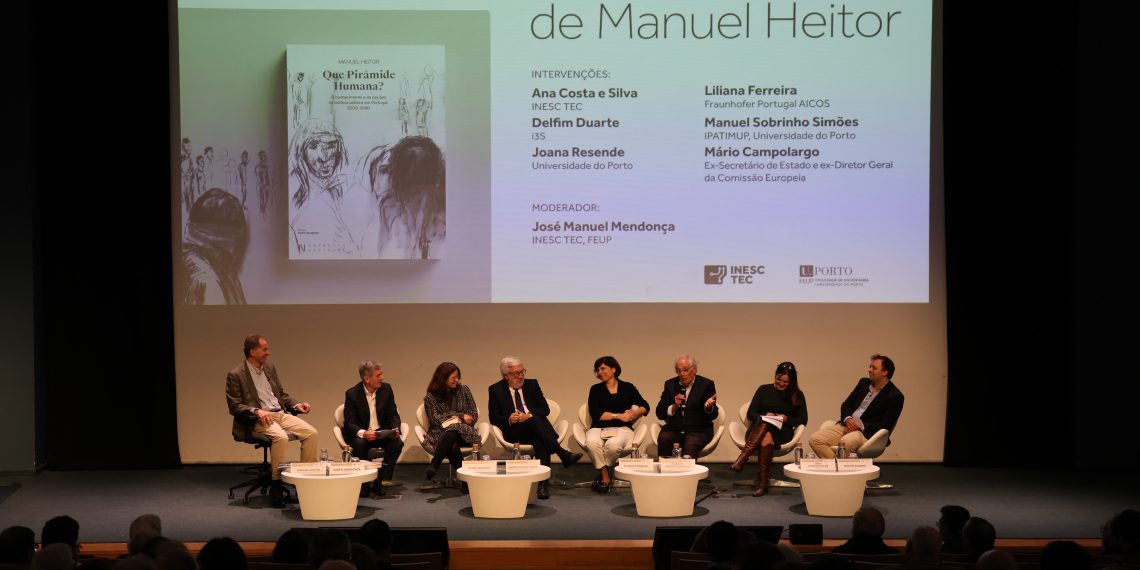“Que Pirâmide Humana?” is the title of Manuel Heitor’s book, in which the former Minister of Science, Technology and Higher Education analyses the evolution of public policies for science, as well as social appropriation, and an outlook on the path to 2030. Following the work developed in Engineering and Public Policies, INESC TEC and the Faculty of Engineering of the University of Porto (FEUP) organised a presentation and debate session on the book and the report on FP10, known as the Heitor Report, bringing together a group of personalities from different areas.
“This restlessness of doing more and better cannot be stopped” – was one of the messages left by Manuel Heitor in the presentation session of his book. Based on the analysis made in “Que Pirâmide Humana? O conhecimento e as opções de Política Pública em Portugal: 2000-2030″, the event focused on exploring the options of public policies for research, innovation and advanced training, and on how knowledge can support them.
In addition to presenting the book, Manuel Heitor also brought to the debate the Report Align , Act, Accelerate – Research, Technology and Innovation to Boost European Competitiveness, which the High-Level Group he chaired prepared at the request of the European Commission. From health to artificial intelligence, this debate, moderated by José Manuel Mendonça, former Chairman of the Board of Directors of INESC TEC, brought together a diverse set of personalities from different areas: Manuel Sobrinho Simões (IPATIMUP and University of Porto), Joana Resende (University of Porto), Mário Campolargo (Former Secretary of State and former Director-General of the European Commission), Liliana Ferreira (Fraunhofer Portugal AICOS), Delfim Duarte (i3S), and Ana Costa e Silva (INESC TEC).
 Among the main ideas, the panel discussed how the book acts as an important diagnostic tool on the evolution of scientific policies and how this diagnosis can help in defining future strategies. Other themes were the organisation of society and leadership; the importance of cooperation and cohesion for a better use of resources; reflection and the call to action for a future of transformation and knowledge – a path to collective happiness; the importance of scientific culture, the diversity of specialisation activities, the appreciation of careers and the promotion of internationalisation. The change in evaluation systems, the evolution of investment in science and the response to societal challenges were other points also addressed by the panel.
Among the main ideas, the panel discussed how the book acts as an important diagnostic tool on the evolution of scientific policies and how this diagnosis can help in defining future strategies. Other themes were the organisation of society and leadership; the importance of cooperation and cohesion for a better use of resources; reflection and the call to action for a future of transformation and knowledge – a path to collective happiness; the importance of scientific culture, the diversity of specialisation activities, the appreciation of careers and the promotion of internationalisation. The change in evaluation systems, the evolution of investment in science and the response to societal challenges were other points also addressed by the panel.
In the book “Que Pirâmide Humana?” Manuel Heitor proposes to observe the evolution of the contexts of knowledge production and dissemination in Portuguese society. From this observation, he makes a critical analysis of the conditions necessary for the development of a mostly happy society. It analyses the evolution of public policies for science, as well as social appropriation, mainly observing the period between 1986 (when Portugal joined the EU) to 2000-2021, and also including a prospective analysis for 2030. Manuel Heitor is a Full Professor at Instituto Superior Técnico and was Minister of Science, Technology and Higher Education of the Government of Portugal between November 2015 and March 2022.
The event took place on November 27, at FEUP.


 News, current topics, curiosities and so much more about INESC TEC and its community!
News, current topics, curiosities and so much more about INESC TEC and its community!